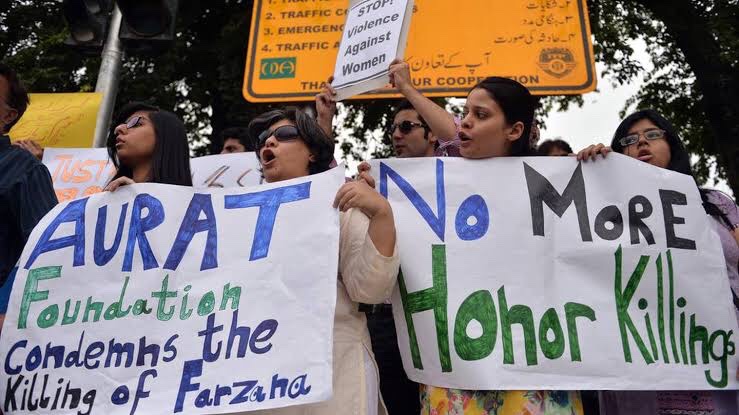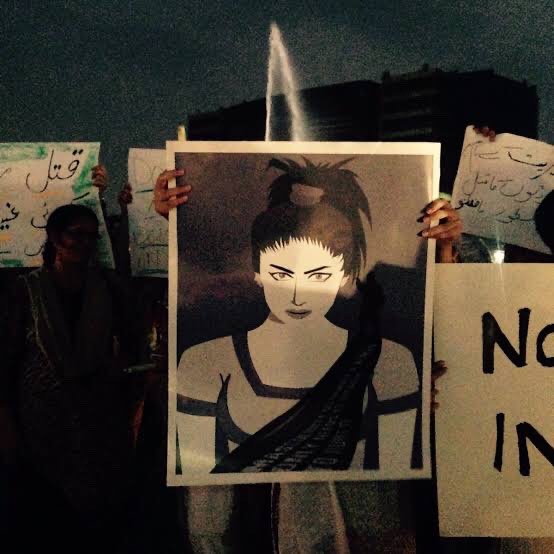“I killed my sister because she brought bad name for the family”,
“I killed her and her lover for family honour. I want it to be a lesson for all girls “.
I killed my wife because she was cheating, I made her an example of for all wives”,
– These are typical answers made by criminals who murdered their own, in order to save their family’s “honour and dignity”.
They are called “Behaya” “Awara” and “ Badchalan” in front of authorities, that too by criminals themselves.

Each year around 1,000 women are killed in Pakistan in the name of honour, according to Human Rights Watch. They are killed for ‘unacceptable’ amorous relationships, defiance of physical or cyber-gendered spaces, bravado in dressing and language, or perceived immorality.

Qandeel Baloch was one of these women who were outcast and eventually murdered for defying patriarchal conventions. Her battle is noteworthy because she inspired and spurred (though posthumously) major reform in Pakistani law regarding ‘honour’ killings. This year marks the sixth death anniversary of her.
Every week in Pakistan, new stories emerge of spouses being strangled, children being shot, and sisters being drowned over a perceived betrayal of family “honour.” Sometimes a single person is to blame, but more often than not, a group of male family members are. The great majority of murderers are never brought to justice just like Qandeel Baloach as Her murderer was released from court last week.
Many others have suffered the same fate since then. Two young girls were brutally murdered by a family member in a Waziristan village earlier this year after a video of them went viral on social media. Waziran, 24, was stoned to death in Jamshoro by her husband and brother in July, purportedly for the sake of honour.
Last year, authorities identified the guy who shot and killed his 19-year-old sister in Karachi for her “frequent encounters” with a “male in the neighbourhood.”
Following the assassination of Qandeel Baloch in 2016, Pakistan’s parliament unanimously passed legislation prohibiting homicides tied to the concept of “honour,” or “izzat.” The death of the social media star, who was assassinated in the name of “honour” by her brother, prompted widespread anger.

Taking a person’s life — usually a woman — in the interest of honour has been viewed differently in our legal system than traditional murder.
The accused — generally men — in such circumstances have often been treated with special tenderness by the courts, who have seen the ‘affront’ to his honour in, say, discovering his sister with her ‘lover’ as a mitigating element that entitles him to a reduced punishment.
When confronted with such a situation, it has been speculated that a man may have been so gravely and unexpectedly aroused that he lost his power of self-control, resulting in the death of the so-called ‘provocation’ perpetrator. Taking a person’s life in such a state of lack of self-control would not be considered “murder,” but rather “culpable homicide,” which is punishable by imprisonment for a term ranging from 10 years to life.
Following the brutal murder of Qandeel Baloch in 2016, the legislature amended the Penal Code and the Code of Criminal Procedure to provide that qatl-i-amd, or murder committed on the pretext of honour, is punishable by a minimum sentence of life imprisonment, regardless of whether the offence is compounded and/or the victim’s family waives qisas. As a result of the modified law, the courts’ former discretion has been revoked, as has the requirement of a family’s desire and/or approval in sentencing in such circumstances.
Finally, the Supreme Court stated that “the Holy Quran… does not sanction murdering on the basis of adultery, much alone on the basis of ghairat [honour]… nor does it prescribe a lesser sentence for such killings.” The court reasoned that all lives are sacrosanct in Islam and that a murder committed in the interest of honour carries no less blame.
The Supreme Court’s explicit focus on the minimum sentence of life imprisonment for killing for honour may have finally closed the loopholes in the statute.
Apart from Judgements and it’s interpretation of 2004 and 2016 amendments and laws, Still there are so many cases of women killing on the name of Honour. The most crucial thing is implementation of rules and laws. Just because of lack of implementation of law and order We have seen massive cases of killing just for the sake of Honour and dignity. The Human Rights Commission of Pakistan reported “little evidence that the incidence of honour crimes has abated” despite the aforementioned legal amendments.

